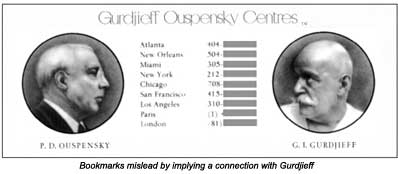Fourth Way Perspectives
The Bite for Power
An Interview with William Patrick Patterson
Spiritual theft and distortion of The Fourth Way are the themes of William Patrick Patterson's book, Taking with the Left Hand. Interviewed in his home in Northern California, he spoke candidly of his opinions of those responsible, as well as of "The Naive Age."
The Gurdjieff Journal: Why did you write Taking with the Left Hand?
William Patrick Patterson: The book was the result of what I experienced when traveling around the country for two months to promote Struggle of the Magicians. We, that is my wife and I and another couple, packed up a van we named Hermes 1 with camping equipment and books and hit the road, with Willie Nelson's "On the Road Again" playing loud and clear on the stereo. It was a great adventure.
TGJ: What exactly happened on the trip?
WPP: I spoke in bookstores from Sacramento to Portland, Missoula, Denver, Chicago, Pittsburgh, New York and Boston, down to Raleigh, Savannah, Tampa, New Orleans, Houston, Santa Fe, Albuquerque, Phoenix, San Diego and Los Angeles—so we pretty much covered all areas of the country. You might say we took the country's "temperature."
TGJ: What did you find?
WPP:Principally, I saw in people a deep confusion. In some cases, a deep bitterness and anger.
TGJ: You are speaking in terms of the spiritual?
WPP: Yes. As Mr. Gurdjieff said, we live in "an empty and abortive interval." Therefore, society, sick from avarice and ambition, does not promote the discrimination and the values necessary to guide one through life. In a deeper sense, of course, the very idea that we divide life up into the secular and spiritual is at the heart of the confusion. You might say we suffer from a spiritual schizophrenia.
TGJ: Yes, ancient civilizations made no such distinction.
WPP: I met many people who had become involved with faux-Gurdjieffian teachers and their teachings—or, to be more exact, whose "teachings" consisted of parts of teachings. People had been exploited spiritually, financially and, in some cases, sexually.
TGJ: What did you tell them?
WPP: In many cases, it was best that I simply listen and understand and say nothing. To others, I reminded them that whatever our experience is—at some level we bought into it, we agreed. So it is ours to learn from, and to continue seeking. When we returned from the trip I felt it was time to give a bigger answer. So I chose three of the more maleficent confusions and did a lot of research on their origin. The result was Taking with the Left Hand.
TGJ: It's so different from either of your previous two books.
WPP: Yes, Eating The "I" was a memoir and evocation of my teacher and the ancient teaching of the Fourth Way. And Struggle of the Magicians was a history and, in a certain sense, an inner exploration of the teaching. This latest book is a cautionary tale, an example of how people bite into power and lead others to do the same.
TGJ: Can you give an example?
WPP: Take Burton. He never had a legitimate Gurdjieff teacher, and the one "teacher" he did have expelled him. So what did he do? He invented his own version of the teaching. Since that would have no appeal, he disguised it by appropriating the title "Gurdjieff-Ouspensky Centres." Though he advertises Gurdjieff he doesn't teach Gurdjieff, only Ouspensky. Stella Wirk, a close student of his from the beginning, said Burton could never read All and Everything, didn't know what Gurdjieff was saying.
TGJ: There were a lot of mismatches from the beginning.

WPP: These mismatches are clues. He has students put bookmarks advertising his brand of the teaching in Fourth Way books, thus giving the unsuspecting reader the impression-suggestion that the bookmark comes from the same source as the content of the book. That's a clue. Then, there's the constant demand for money. Another clue. Then, though he speaks of himself as "master of the emotional center," he seduces young boys and married men, telling them that he is "an angel in a man's body." One could go on.
TGJ: And what of the enneagram community?